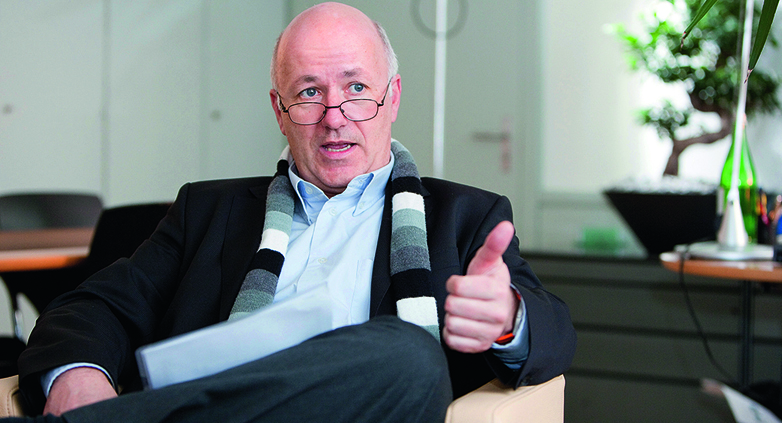Roland Siegwart leaves the Executive Board but remains a fan of ETH
For five years, robotics expert and Executive Board member Roland Siegwart has held the post of Vice President Research and Corporate Relations. He is now in the process of handing over this vice presidency to his successor, Detlef Günther, but he will always remain a firm fan of ETH Zurich.
Roland Siegwart is even more enthusiastic about ETH Zurich now than in 2010, when he succeeded Peter Chen as Vice President Research and Corporate Relations. He is now about to give up this post at the end of the year: “My time on the Executive Board has been a very enriching experience for me,” Siegwart remarks, “It gave me the opportunity to make a big impact”. He has been particularly impressed by the committed and professional way in which researchers and staff members get involved in supporting the university’s future. “I was already a fan of ETH Zurich when I joined the Executive Board,” he says. “Now I believe in it more than ever.”
Roland Siegwart has seen some brilliant successes for research at ETH during his time in office: at a national level, ETH was awarded the leadership or co-leadership of a National Centre of Competence in Research (NCCR) six times in 2010 and 2014, while it was chosen to lead three Swiss Competence Centres for Energy Research (SCCER) in 2013/14. On top of this, ETH researchers coordinated 27 European research projects between 2007 and 2013 and received a grand total of 76 European Research Council (ERC) grants.
As a robotics researcher and professor at the Department of Mechanical and Process Engineering (D-MAVT), Roland Siegwart has witnessed the growing convergence of engineering, biology and medicine. As a member of the Executive Board, he has also been involved in developing this cooperation: for example, saw the launch of the Hochschulmedizin Zürich association, which currently involves ETH Zurich, the University of Zurich and Zurich’s university hospitals.
The Competence Centre for Personalized Medicine, set up in 2014, brings together research groups at the interface between natural sciences, medicine and technology. Meanwhile, the NCCR RNA & Disease, which is co-led by ETH, adds medical faculties and industry to the mix. The Wyss Translational Center Zurich (WTZ) fits in well with this philosophy: by adopting an interdisciplinary approach, the new centre which has been founded on Friday by ETH Zurich and the University of Zurich with donated funds aims to speed up the development and application of innovative medical therapies and robotic systems.
Research networks established
The Competence Centre for Personalized Medicine serves as a prime example of how fundamental research and technical development can enhance one another: the use of computer-aided processes for analysing the human genome (known as DNA sequencing) has revolutionised biological research. Researchers within the competence centre are now developing this technology for medical applications with a view to providing the basis for personalised therapy.
The increasing importance of technology for research is also demonstrated by the various interdepartmental technology platforms established and enhanced at ETH Zurich during Roland Siegwart’s tenure, such as the Binnig and Rohrer Nanotechnology Center (BRNC) or the Scientific Center for Optical and Electron Microscopy (ScopeM). “The platforms make it easier for young researchers in particular to begin forging a career,” says Professor Siegwart, “They can get started on their research quickly, as they don’t have to set up their own infrastructure first.” The platforms also strengthen interdisciplinary cooperation.
Bridging the gap between research and innovation
Under the leadership of Roland Siegwart, ETH has expanded the range of resources available for promoting upcoming young scientists by introducing the Pioneer Fellowships and the Innovation and Entrepreneurship Lab, the aim being to support students and researchers on their way to becoming entrepreneurs. “By helping students and doctoral students who have developed a new idea and demonstrate entrepreneurial flair to take their first steps towards launching their ideas in the market, we are bridging the gap that still exists between research and business startups,” the professor explains.
One of Roland Siegwart’s top priorities was to encourage cooperation with industry. With the ETH Industry Day and the Partnership Councils on the world food system, integrative risk management, electrical energy, manufacturing across scales, information security and sustainable construction, ETH Zurich has introduced new platforms to enable regular dialogue between the university professorships and the world of industry. This exchange gives both sides fresh impetus to pursue further research and develop technologies. One of the highlights for Professor Siegwart has been the Scientifica science days in Zurich: “I find the dialogue with the local population extremely rewarding.”
Roland Siegwart believes that the Executive Board is currently in a strong position at ETH Zurich: “We have made our decisions as a team and built up trust through our dialogue with the departments.” He is now looking forward to having the opportunity to delve back into the world of robotics research. “From the point of view of research, it is ideal if the Executive Board changes after five to eight years. This paves the way for bringing in fresh ideas.”
A firm fan of ETH Zurich
Roland Siegwart has been a member of the Executive Board for five years, but is now about to hand over his responsibilities as Vice President Research and Corporate Relations to his successor.
A condensed version of this article was originally published in the ETH community magazine life.
Please read the article which considers Ralph Eichler's legacy and the articlewhich focuses on ETH professor Detlef Günther, the future vice-president for research and corporate relations and successor of Roland Siegwart.

